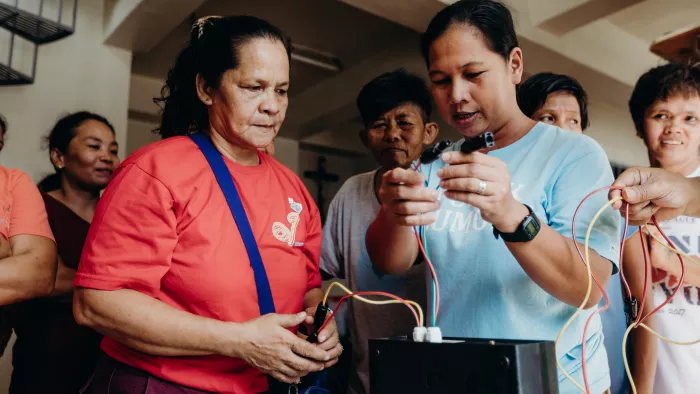ABOUT THE PROJECT
National actors are often best-placed to deliver humanitarian aid in ways that are appropriate, relevant and linked to longer-term development, however due to constraints on capacity, they do not succeed in maximising their contribution to the global humanitarian effort. To be effective and sustainable, capacity development for humanitarian response needs to be as appropriate as possible to the local place and context, this means national actors setting their own agenda.
This project put in place a sustainable approach to ‘shifting power’ towards national actors in the Philippines. Humanitarian capacity development, autonomy and decision-making was transferred to organisations close to people affected by crises; this facilitated more effective and appropriate aid.
Ultimately this project helped national-level organisations and their partners become strong, confident and representative enough to develop their own longer term operating procedures. They were able to work together to generate new resources, and set their own agenda for collaboration with the international community.
HOW THE PROJECT WORKED
Over three years, the project encouraged the formation and growth of collaborative national partnerships and provided flexible grants for those partnerships to decide what capacity development to invest in. This was based on their knowledge of what was needed on the ground. These partnerships were made up of national NGOs (non-governmental organisations), CSOs (civil society organisations) and less traditional humanitarian actors such as research institutes, policy groups and private sector enterprises.
Partnerships were invited to apply for funding to assist with humanitarian capacity development, as identified and described by the partnerships themselves. Exchange of experience and learning was identified as a key requirement for the partnerships.
The release of funds was approved by the consortium of Start Network member agencies in-country and managed by the consortium lead.
WHAT WERE THE AIMS OF THE PROJECT?
- Maintain transparency in the process of selection
- Establish a due diligence exercise for identifying prospective consortia and activities eligible for funding
- Stimulate national-level applications, based on context-specific needs analysis
- Evaluate proposals and funding recommendations
- Resource a strong knowledge management function
- Develop evidence for consortia-managed capacity development.
WHERE DID THE PROJECT TAKE PLACE?
WHO WAS INVOLVED?
The project was delivered by a consortium led by Oxfam Great Britain and included Christian Aid and Tearfund.
FUNDING
The project was funded with £1,655,920 through UK Aid's Disaster and Emergencies Preparedness Programme (DEPP).
KEY CONTACTS
For project management in the Philippines
Jane Bañez Ockelford jaockelford@oxfam.org.uk
For the consortium in the Philippines:
Justin Morgan, Oxfam cjmorgan@@oxfam.org.uk
Maria Rosario Felizco MFelizco@christian-aid.org
Sanjeev Bhanja sanjeev.bhanja@tearfund.org

